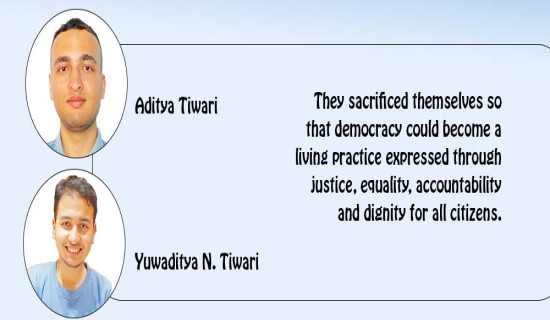- Friday, 30 January 2026
Ensuring Equitable Health Service
The constitution of Nepal has made a clear articulation of basic health care as a fundamental right of its citizens. Over the decades, health system is interestingly progressing in terms of achieving the ambitious social goal of health for all. Considering the health system priorities in the federal context, ensuring equitable access to quality health care services for all is a high priority agenda of policy makers, planners, development partners, civil society, academia and communities.
Historically, the evidence suggests that Ayurvedic treatment system began in the seventeenth century after the establishment of Singha Durbar Vaidyakhana in the country. In those days, traditional health care was the only choice for treatment of illness and diseases in the society. After establishment of Bir Hospital in 1889, modern health care system emerged as a popular approach of health care services. Later, other hospitals and peripheral health facilities were established to expand the health care services.
Health plan
However, a systematic planning of health services began after the first periodic plan of Nepal in 1956. This plan systematically considered a provision of modern health care approach in the health facilities. After this, the development of first-ever long-term health plan in 1975 and the second long-term plan in 1997 were major landmarks in terms of priority and strategic focus on provision of comprehensive health care services to the majority of the populations living in remote areas. Like many other developing countries, Nepal’s health system was greatly inspired by Alma-Ata Declaration on Primary Health Care (PHC) in 1978. This emerged as a major milestone in the twentieth century in public health.
Undoubtedly, persistent social, economic, and political inequalities have a profound impact on health status of people. The follow up conference in 2018 urged the developing countries to further strengthen PHC as an integral part of basic health care delivery at the local level. Consequently, the historic development of national health policy 1991 primarily aimed to improve the health status of rural populations by strengthening primary health care system at local level. With a strategy of establishing effective health care system, the policy made a clear focus not only on preventive, curative and promotive health care, but also considered the need of enhancing community participation in health services. However, it is easier said than done.
Additionally, the Ministry of Health and Population (MoHP) developed second long-term health plan (1997-2017) with a strategy to improve easy access to health care services for those who are particularly poor and socially marginalised in the communities. More importantly, the plan aimed to address the persistent social, economic, and cultural inequalities in accessing the health care. Moreover, the plan highlighted the issues of community participation, gender sensitivity, effective and efficient health care management and role of civil society and private sectors in health care services.
With the technical support from development partners such as WHO and others, Ministry of Health and Population (MoHP) developed first ever health sector reform strategy in 2003. This largely made an emphasis on sector wide approach and effectiveness of foreign aid in health sector. More importantly, the strategic objective aimed to achieve improved health outcomes across poor and marginalised populations by improving access essential health services. In the changed context of federal governance, new national health policy, 2019 primarily aims to enhance inclusive health system which is largely based on social justice and good governance.
The policy helps promote equitable access to health care services for all citizens. It is guided by the principles of multi-sector engagement and partnerships, as well as ensuring provision of specific health services targeted to poor, socially marginalised and indigenous communities. While the concept of health in all policies is gradually in progress, equitable health insurance is considered as an important strategy to meet the health care needs of socio-culturally excluded populations. It is also urgent to strengthen social health protection systems by meaningful engagement of poor and marginalised populations such as sexual and gender minorities and people living with disability in families and communities.
More precisely, external development partners are providing enormous technical support to the governments in addressing the existing gaps and challenges of health system to effectively deliver the essential health care services at all levels. In order to ensure inclusive health services, the Global Fund, for example, is advocating on promotion and protection of human rights and gender equality to accelerate the end of HIV, TB and malaria. Such an inclusion approach will help meet the health care needs of key and vulnerable populations, and strengthen community engagement and responses for improved health outcomes.
Health infrastructure
Recognising the overarching concept of universal health coverage, effective implementation of basic health care services by local health institutions should be an emerging priority for local governments, development partners and civil society. Without adequate trained human resources, good health infrastructure, strengthened laboratory facilities, effective recording and reporting system, robust monitoring and evaluation, uninterrupted supplies of medicines and logistics, it is impossible to provide quality health care services in the rural areas.
Tackling issues of climate change, air pollution, road safety, non-communicable diseases, safe water, sanitation and hygiene in health care facilities require more coordinated and collaborative interventions within and beyond health sector. Therefore, federal health system has both challenges and opportunities to effectively address wider determinants of health at all levels. Therefore, more concerted efforts are needed to strengthen inclusive and accountable health system that helps ensure equitable access to quality health care services for all.
(PhD in global health, Bhandari writes on health and development issues)

















